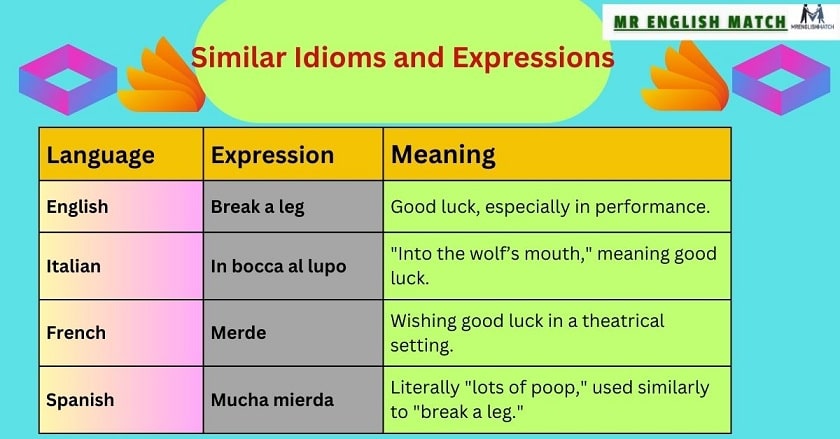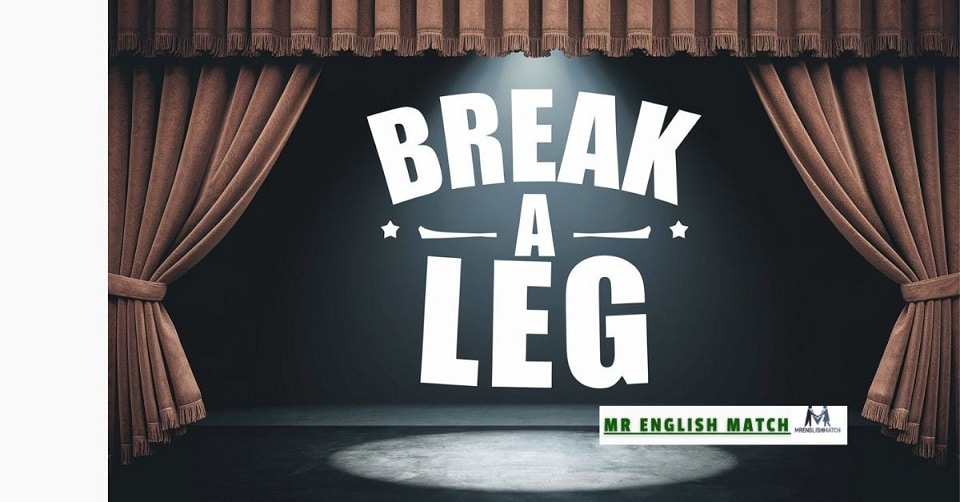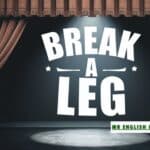“Break a leg” is one of those idiomatic expressions that often raises eyebrows for newcomers to the English language. At first glance, it may sound harsh or even threatening, but in reality, it carries a message of encouragement and goodwill. Now we dive deep into the meaning of “break a leg,” its origins, cultural significance, and how it’s used today.
What Does ‘Break a Leg’ Mean?
The phrase “break a leg” is widely recognized as a way to wish someone good luck, particularly before a performance. Despite its seemingly negative words, it is a positive and encouraging expression. People use it primarily in the context of theater, but its usage has extended to any high pressure situation, such as exams, interviews, or sporting events.
Definition of Break a Leg and meaning
To define “break a leg,” it is an idiom that means “do your best and have great success.” It’s a way to motivate and support someone without invoking the superstition of directly saying “good luck.”
Fun Fact: In the world of theater, wishing someone “good luck” is considered bad luck, leading to the widespread adoption of this quirky phrase.
The Origins of ‘Break a Leg’
Understanding the origin of the phrase ‘break a leg’ requires exploring theater traditions, cultural history, and linguistic evolution. There are several fascinating theories about where this expression comes from.
Theater Superstition
The most accepted explanation is rooted in the superstition of performers. In the performing arts, wishing someone “good luck” is thought to jinx them. Instead, saying “break a leg” is believed to bring fortune and ensure a stellar performance. The phrase reflects the tradition of using reverse psychology to avoid bad omens.
Bowing on Stage
Another theory ties the expression to the act of bowing or curtsying. In theater, “breaking the line of the leg” referred to bending one’s leg at the knee during a bow. A performer would only bow after a successful show, implying they had done well.
German Influence
A linguistic link can be traced to the German expression “Hals- und Beinbruch” (literally “break your neck and leg”), used to wish good luck. This phrase likely traveled through cultural exchanges and adapted into English.
Cultural Contexts
The phrase also finds connections to applause, often exaggerated as “breaking legs” due to enthusiastic stomping by the audience. Such a response signifies exceptional appreciation of a performance.
| Theory | Explanation |
|---|---|
| Theater Superstition | Avoids bad luck by wishing the opposite. |
| Bowing Tradition | Reflects success as actors bow only after great performances. |
| German Origin (Hals- und Beinbruch) | Influenced English with a similar good-luck sentiment. |
| Applause and Enthusiasm | Tied to intense stomping by audiences to show approval. |
Read More:
Appositive Phrase: A Comprehensive Guide
English idioms: What is an Idiom? A Guide to Use Idioms in English
Why Do People Say ‘Break a Leg’?
Some valued reasons with example sentences are given below:
Superstitions and Reverse Psychology
Theater and performance arts are steeped in traditions, and why people say ‘break a leg’ is tied to the belief that directly wishing “good luck” invites misfortune. Instead, using an ironic phrase like “break a leg” avoids tempting fate.
- Before stepping onto the stage for her big performance, Maria’s fellow actors smiled and said, “Break a leg!” as a way to wish her success without tempting fate.
- In the world of theater, it’s considered bad luck to say “good luck,” so instead, performers have adopted the phrase “break a leg” as a charming superstition.
- The director encouraged the cast during the final rehearsal, ending with a cheerful “Break a leg, everyone!” to set a positive and exciting tone.
- As he adjusted his costume backstage, James couldn’t help but chuckle at how “break a leg” turned such a dire phrase into a heartfelt wish for triumph.
- When asked about her pre-show traditions, the lead actress said, “A quick pep talk and a few ‘break a leg’ wishes are all I need to feel ready.”
A Symbol of Success
The phrase also embodies hope for achieving something extraordinary. By wishing someone to metaphorically “break a leg,” the speaker expresses their desire for a standout performance, marked by thunderous applause and critical acclaim.
- As the curtain rose, the director whispered, “Break a leg!” hoping the cast would deliver a performance that earned them a standing ovation.
- Wishing her friend “break a leg” before his audition, Emily expressed her hope that his talent would shine and leave the judges in awe.
- The actor smiled at the phrase “break a leg,” knowing it symbolized the audience’s admiration and a night to remember.
- With “break a leg” ringing in her ears, she stepped onto the stage determined to deliver a performance worthy of critical acclaim.
Modern Usage Beyond Theater
While rooted in performing arts, “break a leg” is now used in various contexts. Whether it’s a student preparing for exams or an athlete gearing up for a big match, this phrase has become a universal good-luck charm.
- As Sam prepared for his final exams, his friends texted, “Break a leg!” to wish him luck and boost his confidence.
- Before the championship game, the coach told the team, “Break a leg out there!” hoping to inspire them to give their best effort.
- When her brother left for his job interview, Sarah grinned and said, “Break a leg!” knowing it would lighten the mood and convey her support.
- Though traditionally a theater phrase, “break a leg” has become the perfect way to cheer someone on, whether they’re stepping onstage or stepping into life’s challenges.
‘Break a Leg’ in Modern Usage
The idiom has expanded beyond its theatrical roots and found a place in everyday language. Here are some common modern uses:
- Casual Conversations: Friends often say “break a leg” before important events like job interviews or presentations.
- Social Media Trends: GIFs and e-cards featuring the phrase have made it a digital-age favorite. For example, you might send a break a leg gif to a friend performing in a school play.
- Cultural References: In movies and TV shows, characters often humorously use the phrase, further embedding it into pop culture.
Examples of Usage
- “You’re going to nail this audition—break a leg!”
- “Tomorrow’s the big game. Break a leg out there!”
Similar Idioms and Expressions

Every language has its own unique way of wishing good luck. Comparing “break a leg” with these expressions offers insight into cultural differences.
| Language | Expression | Meaning |
|---|---|---|
| English | Break a leg | Good luck, especially in performance. |
| Italian | In bocca al lupo | “Into the wolf’s mouth,” meaning good luck. |
| French | Merde | Wishing good luck in a theatrical setting. |
| Spanish | Mucha mierda | Literally “lots of poop,” used similarly to “break a leg.” |
Fun Facts and Trivia About ‘Break a Leg’ meaning
- Crossword Connection: The phrase often appears in puzzles. For example, “break a leg preceder crossword clue” could hint at something like “good luck.”
- Historical Myths: Stories about shepherds breaking the legs of lambs to keep them from wandering are sometimes linked to the phrase, although this is largely speculative.
- Macbeth Connection: The taboo around saying “Macbeth” in theaters aligns with the superstition behind using “break a leg.” This adds another layer of theatrical mystery.
FAQ
What is the ‘break a leg’ meaning ?
“Break a leg” is an idiom used to wish someone good luck, particularly in performance arts.
Why is ‘break a leg’ used instead of good luck?
The phrase originates from theatrical superstitions, where saying “good luck” was thought to bring bad luck.
Where does the phrase ‘break a leg’ come from?
Its origin is debated, with theories pointing to theater traditions, German expressions, and applause-related metaphors.
Is saying ‘break a leg’ only for theater performances?
No, it’s widely used today for any high-pressure situation where success is desired.
Conclusion
The phrase “break a leg” is more than just an idiom—it’s a testament to the rich traditions of theater and the creative ways humans express goodwill. Its mysterious origins and widespread usage make it a fascinating part of the English language. Whether you’re about to step on stage or tackle a tough challenge, someone saying “break a leg” is rooting for your success.
So, the next time you hear it, smile and embrace the positive vibes behind this seemingly puzzling phrase. Break a leg!








